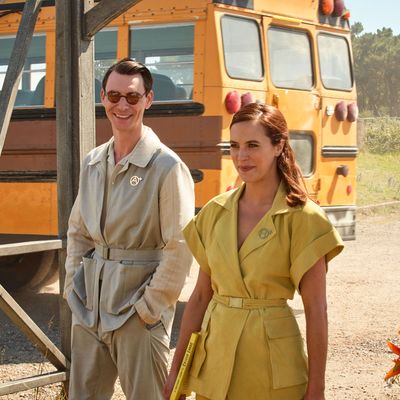
For the most part, new streaming services come with a now-familiar two-part offering. First, there is the library, the collection of known titles that guarantees the service will already have something of value to most customers. Disney+ came with Marvel movies, HBOMax came with a huge film library including hard-to-find classics like the Studio Ghibli catalogue, and NBCÔÇÖs new Peacock service has NBC Universal titles like Law & Order, 30 Rock, and a world of Bravo reality. But the second prong in the New Streaming Service Promise is always an iffy proposition: original programming. Outside of possibly The Baby Yoda Show on Disney +, no new streaming service in the past several months has come with original programming worth a subscription all on its own.
PeacockÔÇÖs Brave New World is not an exception to the rule, but unlike Netflix, Disney+, and Amazon Prime, Peacock is available for free ÔÇö and at that price, Brave New World is perfectly fine. It is attractive and, at points, even compelling TV; the adaptation is neither too close nor too far from the original source material; and at major twists in the plot, it did make me curious about what would happen next. ItÔÇÖs not at all exciting or innovative, though, and, especially later in the series, several of the major plot developments seem held together mostly with abstract CGI visuals and overly on-the-nose board-game metaphors.
ItÔÇÖs hard to say what the world will look like two weeks from now, two months from now, two years from now ÔÇö thatÔÇÖs the Real Future, and itÔÇÖs terrifyingly in flux. But TV has settled on a very good idea of what the Fictional Future looks like. It is slick and seamless and rendered in high-gloss metallics, severe streamlined hairstyles, ever-present computer interfaces, and the total control of messy human nonsense like emotions and physical flaws. ItÔÇÖs the Westworld vision of humanity, in which sterile surfaces are everywhere and dirt is around only to signal (false) authenticity, and Brave New World is not interested in reimagining that very familiar look. ThereÔÇÖs the controlled, polished world of New London, where no oneÔÇÖs clothes are ever wrinkled and no one cries, but no one actually feels happy, because all their emotions are chemically controlled. Then there are the Savage Lands, a dirty, chaotic, hardscrabble place full of uncivilized people, used primarily as a theme park for the New Londoners. And as in Aldous HuxleyÔÇÖs original novel, there are characters who represent various problems and opportunities of these dystopian places. ThereÔÇÖs Lenina (Jessica Brown Findlay), a New Londoner who finds herself unexpectedly drawn to the wild disorder of the Savage Lands; John (Alden Ehrenreich), a Savage Lands resident whoÔÇÖs actually the son of New Londoners; and Bernard (Harry Lloyd), a New London middle-manager type who finds himself pulled in opposite directions.
There are also many orgy scenes. There are arguably too many orgy scenes, especially because the showÔÇÖs depiction of sex is mostly designed to argue that the New LondonerÔÇÖs experience of physical pleasure is empty and meaningless. The surfeit of orgies mostly achieves that, but itÔÇÖs hard to get over the sense that Brave New World wouldnÔÇÖt mind if its viewers were at least a little titillated by all the sex, even when the bigger message is supposed to be how ungratifying it is. And although the sex and physicality of the show are absolutely part of the original novel, their presence is also just one more way Brave New World feels like every other dystopia rather than a bracing work of individuality. ItÔÇÖs a little strange to say, but the orgy scene feels like a basic box that has to be checked in any depiction of an enlightened but broken future society, going back to Star Trek and including stories like Battlestar Galactica and Westworld. ItÔÇÖs in the Matrix trilogy, too, which is a major influence on this TV adaptation: One of the few significant changes it makes from the bookÔÇÖs underlying social structure is the addition of a Matrix-like computer network that plugs into and feeds from individual brains.
ItÔÇÖs not Brave New WorldÔÇÖs fault that HuxleyÔÇÖs novel has become so influential and ubiquitous in the history of dystopian imaginings that all of his nearly 100-year-old ideas now feel yawningly overfamiliar. John arrives in New London and becomes a great disruptor, creating a shock wave that rattles the system. The book Brave New World was itself intended to be a similar disruption, a startling strangeness meant to jolt its readers. It succeeded. Without its own imaginative leap, though, the TV show instead feels as if itÔÇÖs echoing ideas from the past. ItÔÇÖs very weird for a dystopia to feel kind of comforting, but thatÔÇÖs what the TV adaptation of Brave New World is. ItÔÇÖs a story built to be a social alarm bell, but the bell plays an immediately recognizable melody. I knew I was supposed to be running to do something about the alarm. Instead, I was happy to just hum along.


